South Africa
Zuma to continue cooperation
Following a meeting with the commission chair, Zondo said the former president had agreed to continue cooperating with the inquiry via his legal team by providing written statements.
“It is contemplated within this agreement that at a certain stage the former president will come back and give evidence,” said Zonda, who then adjourned Friday’s hearing.
July 19: Zuma’s lawyers suspend cooperation
President Jacob Zuma’s legal team told the corruption inquiry on Friday that their client would not take part in the inquiry further because he felt that he was being questioned unfairly.
“Chair, we are here today to say we will take no further part in these proceedings,” lawyer Muzi Sikhakhane told the inquiry.
He said Zuma had been subject to ‘relentless cross-examination’ and is being obliged to answer questions put to him by the commission evidence leader Paul Pretorius, yet he was ‘not called in line with any rules’.
The former president was invited to offer clarity on the statements made by former ministers and senior government officials which implicated him in the capture of the state.
Following Zuma’s withdrawal from the commission proceedings, the chair, deputy chief justice Raymond Zondo emphasised the fact that the decision to call Zuma before the commission was his decision and his alone.
“I, therefore, do not want Mr Pretorius or the commission’s legal team to be criticised for that decision. I made it alone. I believe it was a correct decision and still believe it was a correct decision.”
Zuma cries foul
South Africa’s deputy chief justice Raymond Zondo on Wednesday adjourned until Friday morning a public inquiry into state corruption, after lawyers Zuma’s lawyers said he was being questioned unfairly.
Zuma’s lawyers have argued that the inquiry’s lawyers should not cross-examine the former president because they say evidence given by other witnesses does not directly implicate Zuma in corruption and fraud.
“Chair I hear you, and I appreciate what you’re saying, but I’m really being cross-examined very thoroughly on the details. And I don’t know how come,” Zuma told the chairman of the inquiry.
Zuma’s lawyers told Zondo that the former president, who has been testifying since Monday, had been brought to the inquiry under “false pretences” because he was being cross-examined, whereas he thought he would only have to answer straightforward points of clarity.
“The former president has expressed certain concerns,” Zondo said. “It has been decided that we should adjourn the proceedings for the day, and we should not sit tomorrow in order to give a full opportunity to the commission’s legal team and the former president’s legal team … to see whether a way can be found in which his (Zuma’s) concerns are addressed.”
July 17: Zuma denies interfering in Transnet deal on Day 3
Former president Jacob Zuma on Wednesday denied having interfered with the appointment of a chief executive at transport and infrastructure company Transnet, during his third day testifying at a corruption inquiry.
Transnet, which operates railways, ports and fuel pipelines, is one of a handful of state-owned firms that became embroiled in corruption scandals during Zuma’s tenure.
Former public enterprises minister Barbara Hogan told the inquiry that Zuma had told her at a meeting in 2009 that Siyabonga Gama was his “only choice” to be CEO of Transnet.
Gama was at the time subject to disciplinary proceedings because of procurement irregularities, and Hogan said Transnet’s board of directors wanted to appoint another candidate it deemed better qualified for the job.
Asked whether he had told Hogan that Gama was his only choice for Transnet CEO, Zuma told the inquiry: “It couldn’t be like that, we don’t work like that. As I say there was a process. … I would have been undermining the process.”
Gama eventually became Transnet CEO in 2015 and was involved in allegedly corrupt contracts worth tens of billions of rands to procure locomotives.
Gama, who was fired last year after trying unsuccessfully to halt his removal, was not available for comment. He has denied the allegations against him.
A Gupta-linked firm earned huge consulting fees from the locomotives deal.
The Guptas, who left South Africa around the time Zuma was ousted, have consistently denied having looted state firms like Transnet.
Transnet has sought to recover via the courts money it says was misspent under Gama’s leadership.
State prosecutors have said they are following the inquiry and they could open cases if sufficient evidence of wrongdoing emerges.
Day 2 of Zuma’s testimony
South Africa’s ex-president Jacob Zuma on Tuesday said he had received a death threat after his testimony the previous day to an inquiry on corruption.
Appearing for the second day at the commision of inquiry into state capture, Zuma said his personal assistant received a phone call late on Monday from an unknown caller threatening to kill Zuma and his children.
The country’s deputy chief justice, Raymond Zondo, who is overseeing the inquiry, said the threats were unacceptable.
There was no immediate comment from the police.
Zuma’s lawyers then argued that the inquiry’s line of questioning was inappropriate because it amounted to cross-examination. This led to a brief delay before the presiding judge urged those questioning Zuma to bear this in mind.
Zuma’s lawyers said the testimony at the inquiry so far had not implicated the former president in corruption or fraud, so he should not be cross-examined but should merely answer questions for clarification purposes.
When proceedings finally kicked off, Zuma was asked about an incident where one of the Indian-born Guptas allegedly offered former ANC lawmaker Vytjie Mentor the position of minister of public enterprises.
Zuma replied saying; “I know nothing about it”, repeating the same phrase several times and once letting out a chuckle.
Mentor told the inquiry that the offer of the ministerial post was conditional on her canceling a lucrative South African Airways flying route to India.
She said she refused the offer, which she said was made in 2010 at a time when Zuma was at one of the Guptas’ residences.
“No there was nothing of that nature. I was never in some room,” Zuma said when asked whether he was in the Guptas’ home when the job offer was allegedly made to Mentor.
Zuma, 77, said he had never discussed ministerial appointments with the Guptas.
Several witnesses other than Mentor have told the inquiry that the Guptas were privy to information about senior government appointments.
He however confirmed he had met the Gupta brothers to discuss the New Age, the newspaper that he had encouraged them to set up in 2010.
Asked whether he met with the Guptas over the newspaper project, he replied: “From time to time they briefed me.”
“They were just briefing me on progress they were making in establishing that business, the newspaper, not the financing,” he said.
Zuma denied that he knew about alleged harassment of civil servants by Gupta executives demanding that the government’s advertising budget was spent with the newspaper.
Zuma also denied on Tuesday that he had issued an instruction to remove Themba Maseko, former head of the government communications service, from his position after Maseko refused to direct state advertising money to the Guptas’ media company in 2011.
Zuma, expected to testify until Friday, was supported at the inquiry by his son as well as prominent allies including ex-finance minister Malusi Gigaba.
ANC Secretary General Ace Magashule, a close ally of Zuma, addressed reporters during a break in the proceedings on Tuesday and suggested the inquiry’s focus on the Gupta family was misguided.
Magashule, who is in charge of the day-to-day running of the ANC, has made comments that have directly contradicted Ramaphosa and his faction in the ANC in recent months.
“I don’t know why South Africa is not actually investigating every company which has worked with government, and why we are actually targeting one particular company and family,” Magashule said. “Tell me which company has not met with government.”
Magashule declined to answer a question about whether he thought the inquiry was biased, as Zuma’s lawyers have said.
July 16: Day 1 of Zuma’s testimony
South Africa’s ex-president, Jacob Zuma on Monday defended himself at the commision of inquiry into state capture, where he is accused of having presided over a corrupt government.
Over the past year, this commission, chaired by the Vice-President of the Constitutional Court Raymond Zondo, has heard from dozens of ministers, elected officials, businessmen and senior civil servants who have come to expose the shady cases of the Zuma era (2009-2018).
The former head of state, 77, is suspected of illegally granting lucrative public contracts and undue advantages to a sulfurous family of Indian businessmen with whom he is close, the Gupta.
July 15: Zuma’s testimony
Zuma told the inquiry that there was a conspiracy against him and that his enemies had subjected him to a “character assassination” because they wanted him out of power.
“This commission, from my understanding, was really created to have me coming here, and perhaps to find things on me,” Zuma said in his opening remarks at the inquiry, looking relaxed and wearing a dark suit.
“There has been a drive to remove me from the scene, a wish that I should disappear.”
About his controversial links to the Gupta family, Zuma said he had never broken the law with them, describing the businessmen at the centre of an influence-peddling scandal as friends.
“I never did anything with them (the Guptas) unlawfully, they just remained friends. … Never, never did I discuss any matter that does not belong to them,” Zuma told the inquiry.
“They were businesspeople and successful businesspeople,” Zuma continued, referring to the three Gupta brothers. “I’m not a businessperson, I know nothing about business, I’m a politician, I know something about politics.”
He said he could trace this to the early 1990s, when he received an intelligence report that two foreign intelligence agencies and a branch of the apartheid government that was in power at the time had come up with a strategy to get rid of him.
He did not name where the foreign intelligence agencies came from, only that they were from “big countries”.
“They (my enemies) took a decision that Zuma must be removed from the decision-making structures of the ANC. That’s why the character assassination, that is the beginning of the process that has put me where I am today,” Zuma said.
Zuma also hinted that he could spill the beans on ANC comrades who had spoken out against him.
“I’ve been respectful to comrades, maybe I’ve reached a point where that must take a back seat.”
.embed-container { position: relative; padding-bottom: 56.25%; height: 0; overflow: hidden; max-width: 100%; } .embed-container iframe, .embed-container object, .embed-container embed { position: absolute; top: 0; left: 0; width: 100%; height: 100%; }
Jacob Zuma was forced by his successor, Cyril Ramaphosa, to resign a year and a half ago at the head of the ruling African National Congress (ANC) and the country.
But he has always denied that he was involved in all the scandals that have splashed his reign.
Reactions to Zuma’s testimony
Asked about Zuma’s comments, ANC spokesman Pule Mabe said the party would give the inquiry space to do its work.
“The ANC is not on trial here,” Mabe said.
Natasha Mazzone, a senior lawmaker with the opposition Democratic Alliance party, said Zuma was trying to whitewash serious allegations.
“The fact that we’ve heard a conspiracy theory dating back to 1990 is proof that the real truth is going to take a long time to extract,” Mazzone said.
Rudie Heyneke from the Organisation Undoing Tax Abuse said the inquiry could find it difficult to pin much on Zuma because he had “always been careful to stay a layer or two away from the action”.
Reservations from Zuma’s lawyers
In a letter made public last month, his lawyer Daniel Mantsha questioned the impartiality of the commission of inquiry by accusing it of seeking “only one truth” and wanting to “trap and humiliate” his client.
Although he did not obtain the list of questions that Judge Zondo plans to ask him, Jacob Zuma agreed to respond to his non-binding summons, in principle until Friday, July 19. But there is still doubt about the attitude he will adopt at the hearing, which will be broadcast live on television.
“The committee asked me to come and testify and provide it with any information I may have in my possession,” Zuma told the press this week. “I’m going to go and we’ll see how things turn out.”
The case against Zuma
Since it launched its hearings, the Zondo Commission has compiled a thick case against the former president.
A former minister, Mcebisi Jonas, came to tell how the Gupta brothers had come to offer him in 2015 the morocco Finance in exchange for his help in obtaining contracts and a bribe of 600 million rand (nearly 40 million euros).
According to Mr. Jonas, Ajay Gupta then told that “You have to understand that we control everything (…) and that the old man (Zuma) will do whatever he tells us to do”.
Another Finance Minister, Nhlanhla Nene, testified that he was thanked the same year by Jacob Zuma for refusing a lucrative nuclear contract project that would have benefited the same Gupta brothers, owners of a uranium mine.
In turn, the current Minister of Public Enterprises Pravin Gordhan also settled his accounts with Jacob Zuma, accusing him of having “allowed a climate of impunity allowing corruption” and the “capture of the State” by private interests.
Gordhan has estimated that 100 billion rand (€6 billion) of public funds have been diverted in recent years in his country.
The main opposition party, the Democratic Alliance (DA), has been a long-time critic of the turpitudes of the Zuma regime and welcomed its hearing. “There can be no immunity for Jacob Zuma,” said MP Natasha Mazzone, “he must be held accountable for his role in capturing the state.
Despite all the accusations against him, the former president has still not been formally charged. He is currently being prosecuted in only one case involving bribes paid on the margins of an arms contract signed… twenty years ago.
In defence of Zuma
Zuma still has allies and a group of several dozen supporters broke into clapping and chants of “Zuma” as he entered the hearing room.
Outside, supporters wearing military clothing emblazoned with the emblem of the former armed wing of the ANC shouted: “Hands off Zuma!”
One of them, Bongani Nkosi, said he thought the inquiry was out to get Zuma and that he had enemies because he supported radical economic policies to help poor black people.
Ramaphosa, Zuma’s former deputy, has made sweeping personnel changes in government and state-owned companies as part of an effort to curb corruption and revive the stagnant economy.
But he has been hampered by the lingering influence that Zuma and his allies exert over the ANC’s top decision-making bodies, as well as by the scale of the problems he inherited.
Zuma, expected to give testimony to the inquiry from Monday to Friday, has also been in court on several occasions over the past year to answer corruption charges linked to a deal to buy military hardware for the armed forces in the 1990s.
The inquiry is a rare example of an African leader being brought to book soon after losing power.
Agencies



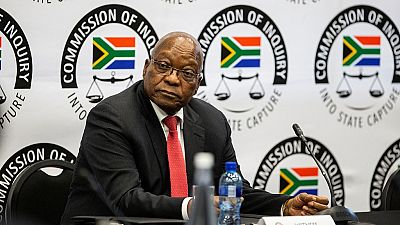

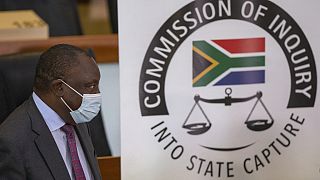
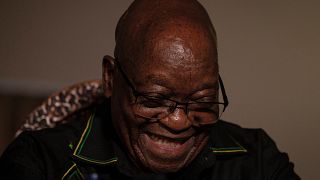

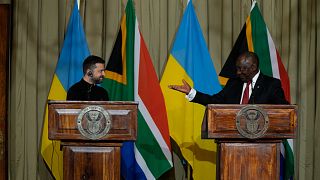
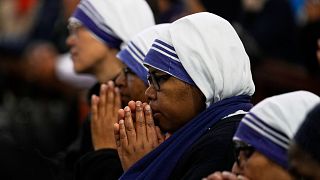


Go to video
Tunisia jails opponents, critics of President Saied
Go to video
Uganda plans law to allow military prosecution of civilians
Go to video
South Africa's tax row heads to court as implementation date nears
Go to video
Meta boss Mark Zuckerberg takes the stand in antitrust trial
Go to video
South Africa appoints Mcebisi Jonas as special US envoy in bid to ease tensions
Go to video
Mauritius: Ex-finance minister released on bail after corruption charges